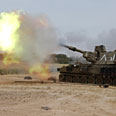
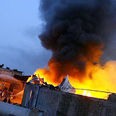
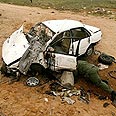
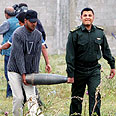
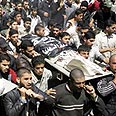
However, it appears Palestinian residents living in what has become a full-fledged war zone wedged between the IDF and Qassam cells have been forgotten.
Gaza under attack (Footage: Reuters)
IDF officials, meanwhile, are aware of the damage but note they have no intention of harming civilians.
"We regret such harm," army officers say.
As they contend with the presence of Palestinian gunmen and the persistent Israeli shelling, residents told Ynet about a sense of living in a firing range and contending with constant fears.
"Life in recent weeks is unnatural. It's a war movie, a horror movie that keeps on becoming more frightening," 27-year-old Osama al-Bidi says. "Wherever you go, there are homes with shrapnel and holes, homes that have been damaged. Some of the homes are empty because dozens of families left. How will these families return when their homes are in such condition?"
Al-Bidi says 15 residents of the northern Gaza Strip town of Beit Lahiya, including four members of one family, were wounded in the past 24 hours.
"Yet it's not only people who are hurt," he says. "Many people here subsist on raising cattle, and many animals have been killed in recent days. Only today, four cows died after a shell hit their farm. This means the livelihood of many people is being destroyed."
Despite the IDF's insistence it targets "open fields" and Qassam rocket launching sites, Osama describes a different reality.
"Anyone who wishes to should come here and see where the Israelis are shooting. No open areas, everything is close, even very close, to the homes," he says. "Anyone talking about open areas should come and see if the shooting is really directed at open areas. The fire gets really close to people."
'Constant shelling'
Hani Sarur from Beit Lahiya says "life in the town moves on between one boom to another, sounds of shells and ambulance sirens."
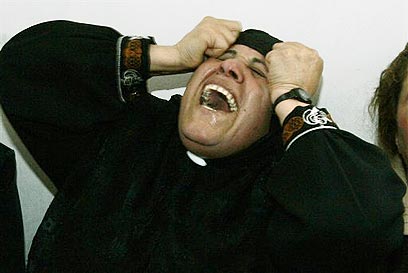
Relative of Palestinian killed by IDF (Photo: AP)
"Every minute, sometimes almost every second, there are shells from the ground, sea, and air," he says. "And those are hard shells, with the shrapnel being scattered to a distance of 200 and even 300 meters (about 600-900 feet,)" he says.
"But in recent days, not only the shrapnel is coming closer, the shells themselves are landing increasingly closer to homes and not to those open areas the Israelis are talking about," Sarur adds.
The Gaza resident says the situation is becoming increasingly scary.
"You can feel the shell flying above your head and about to fall any moment," he says. "In early evening hours, particularly on streets at the edge of town, there's no traffic and it turns into a short of ghost town."
Local residents are slowly becoing indifferent in the face of the situation and are merely trying to live on with the fear and constant shelling, Sarur says.
"The people feel they have nothing to lose anymore, and therefore we don't care about those leaflets the Israelis drop from the air where they ask us to act against those who fire rockets," he says. "Even if nobody likes the situation, people don't care anymore."
Gunmen: Occupation to blame
When it comes to the gunmen, Israel and the "occupation" bear full responsibility for the situation. According to the gunmen, "it's not surprising that Israelis would cast the blame on us. This is the occupier's line of thought. Those who think that the responsibility is divided equally are lying to their public. The occupation is responsible."
Abu Khmaid, one of the al-Aqsa Martyrs' Brigades commanders in the Gaza Strip, says: "Our people, also those living in the northern Strip, see the daily assassinations the Israelis are carrying out in the West Bank, and they are not ready for us to refrain from responding to Israel's crimes in the West Bank."
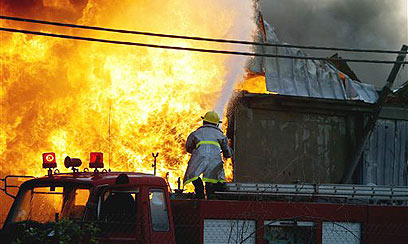
Gaza factory on fire (Photo: AP)
According to Abu Khmaid, "the rocket launchers fire when there is an assassination in the West Back or a deep entry into a Palestinian community, which is accompanied by injuries."
"We are not the ones initiating the fire. Our fire comes when we see our brothers in the West Bank being killed. We will not allow the Israelis to distinguish between the West Bank and the Strip, between one kind of Palestinian blood and another kind of Palestinian blood," he says.
Abu Khmaid adds that "it is true that the Palestinian street, especially the one in the northern Strip, is unsatisfied with the situation, but the people are unsatisfied with the occupation and its ramifications and not with what we are doing and the way we're retaliating."
"The people here in Gaza feel no withdrawal. The Israelis are sitting on our crossings, choking us through a continuous economic siege, and believe me that the shells the Israelis are firing are the less difficult part of all that is happening. The people are dying of hunger and are deprived of their livelihood because of the Israeli policy, but all this will not convince our people that we will agree to the West Bank becoming a war zone without us interfering," he concludes.
IDF: Terrorists making use of population
The IDF Southern Command, which is orchestrating the wide-scale operation in the Gaza Strip, is following up on every report on the Palestinian side, especially injuries among civilians or damage caused to property.
"Once the decision was made to change the operational pattern and do something else, we made it clear to the Palestinians that we removed restrictions and we will fire at any place used to launch Qassam rockets at Israel," a military source said.
According to the official, "our activity is aimed at terror organizations, at the groups that are trying once and again to hurt Israeli citizens. Unfortunately, they operate more than once near Palestinian police officers' posts, thinking that this would provide them with protection. Up to now, our response was restrained, but now the constraints were removed and Palestinian police posts are not immune anymore."
"The terrorists are making similar use of the population when firing Qassams. They are firing from the houses so that the IDF won't fire back and hit them, so there is a new policy here as well. Therefore, we distributed leaflets and asked the residents who are in the launching areas to leave the site. Those who are there are risking their lives," another military source said.
Meanwhile, senior IDF officials explain that the new step aims to achieve two objectives: Pursuing terror groups wherever they are and conveying a message to the leadership that if it does not interfere and work to stop the fire, civilians used as a shield by terrorists would also be hurt.
"The terror organizations never had mercy on the Palestinian population. Any terror attack at the Erez crossing or a warning at Karni (crossing), led to its closure, and who was hurt? Civilians. The operation now conveys a clear message – we do not bear responsibility, but rather, the terror organizations and the Palestinian leadership do," an army official said.
IDF officials are not talking about easing off when it comes to the ongoing Gaza operation, and are also not talking about "victory" in light of military successes in recent days and the relative drop in the firing of Qassams toward Israel.
"At the moment, the operation will continue and whoever is involved in terror will be hurt," an army official concluded.
Hanan Greenberg contributed to the report















